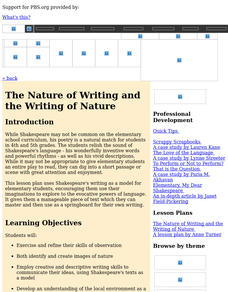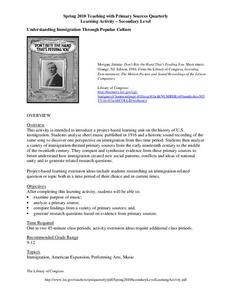Anti-Defamation League
The Name Jar: Discussion Guide for Grades Pre-K–1
A lesson spotlights the story, The Name Jar, by Yangsook Choi. After a read-aloud, the class retells the story using puppets or dress-up. They participate in a thoughtful discussion about the story, answer questions relating the book to...
University of Georgia
What's So Special about Bottled Drinking Water?
Is artesian water designed to be better, or is it just from wells similar to those in the city of Artesium? This experiment looks at many different types of bottled waters, including artesian. Using a soap mixture, scholars test to see...
Virginia Department of Education
The Particle Theory of Matter
Demonstrate the particle theory of matter to high school scientists with an engaging experiment that allows them to visually see the results as substances change from one state to another. The class concludes with a discussion about how...
Curated OER
Ecology - Reproduction and heredity
Students correlate signs of spring with reproductive strategies of varioius organisms. They describe how organisms inherit traits from generation to generation.
Curated OER
Seasonal Cycles And Changes
Second graders recall the affect of direct and angled sunlight on the seasons, describe some results of warming soil and air in spring, predict the changes in buds when twigs are placed in water, and taste a product of tree sap and...
Curated OER
Playground Greenup
Students document changes in the playground vegetation during the year by making drawings or taking digital photographs of grass, trees, bushes, weeds, and other vegetation. They study how the color of vegetation changes during different...
Curated OER
Tides & Lunar Cycles
Students demonstrate how the moon affects the tides, a neap tide, and spring tides by using their bodies as models. After students observe the model they created, they draw and label the diagram on a provided worksheet. They then log...
Curated OER
MASS
Students distinguish between weight and mass. They examine how in oscillations of a mass against an elastic spring--in the absence of gravity, or in horizontal motion--the length of the oscillation period is proportional to the square...
Curated OER
Identifying Setting and Completing a Story Map
Second graders complete a story map for Frog and Toad Are Friends. In this making inferences lesson students find specific details from the book to complete their story map. They map one chapter at a time.
Curated OER
Springbreak Trip
Twelfth graders plan and calculate the cost of taking a specific Spring Break trip, with a certain budget and given set costs. they determine miles traveled, gas costs, hotel expenses, etc.
Curated OER
Autumn Arrays
Autumn is a time for nature to get ready for the upcoming winter. After listening to the book Time to Sleep about the changes of deciduous trees in the fall, learners monitor a tree on a daily basis and view photos of fall foliage online.
Curated OER
The Tides-Ups and Downs
Students investigate tidal patters and the forces that cause the tides. In this tidal lesson plan, students explore and research the tides and complete 43 questions about the causes of the tides, how they are monitored and measured and...
Curated OER
The Best Friend of Charleston, The Charleston Railroad
Third graders explore the Charleston Railroad. In this South Carolina history lesson, 3rd graders examine the impact of the rail line on economy and citizens of the state. Students create posters to advertising the railroad line that...
Curated OER
Autumn
Take a walk through the forest as the leaves change color and fall from the trees, making way for a new ecosystem cycle to cycle through. An inquiry-based lesson plan examines how the process of decomposition eliminates tons of biomass...
Curated OER
Aquaculture
Students examine an experiment in which 2 types of commercial fish are fed a new type of fish feed and a commercial fish feed which costs ten times as much. They calculate in the fish grow as well with the cheaper fish feed and then...
Curated OER
Mighty Oaks from Little Acorns
What does it mean to grow? To germinate? For the plan detailed here, class members investigate the growth process of an oak tree while focusing on the beginning stages of planting and germination. They plant seeds and record observations...
Curated OER
How Poets Evoke Social and Historical Representations
Students explore how poems represent the social, historical, and cultural times that they were written in. In this poetry lesson plan, students compare and contrast poems with music of the time and explore implications of writing poems...
Curated OER
Shakespeare: The Nature of Writing and the Writing of Nature
This lesson plan uses Shakespeare's writing as a model for elementary students, encouraging them use their imaginations to explore to the evocative powers of language. It gives them a manageable piece of text which they can master and...
Curated OER
Follow The Road to Riches
Students examine the various events occurring at the time of the Gold Rush. They see archival photographs and hear historians talk about this era. They create a time line in order to facilitate thinking about this region during the...
Curated OER
Cities and Seasons
Students explore how satellite images show seasonal changes in seven cities in North and South America. Through a sequence of images, they study the green-up and brown-down of the seasons and how seasons change over time. Afterwards,...
Curated OER
Forces in Action
Students investigate questions centered around force and motion by going through the scientific process and creating fair tests and experimentation. In this lesson about forces-in-action, students diagram their findings and explore other...
Library of Congress
Understanding Immigration Through Popular Culture
Class members are introduced to a project-based learning unit on US immigration with an activity that asks them to analyze sheet music and other primary source materials to uncover issues raised by immigration.
EnLiST
Trap Your Own Insects: What’s in Your Backyard?
Young entomologists construct three types of insect traps—pitfall, pollinator, and panel—before setting their traps out and observing what they caught. They then observe what types of insects the different traps attract.
Michigan State University
Gases Matter
Young scientists learn that seeing isn't necessarily believing when it comes to the states of matter. After performing a fun class demonstration that models the difference between solids, liquids, and gases, children complete a series of...
Other popular searches
- Reading Spring Time
- Spring Time Bulletin Boards
- Spring Time Acrostic Poetry
- Art Spring Time
- Writing Spring Time
- April Spring Time
- Spring Time Crafts
- Art for Spring Time
- Spring Time Music
- Limericks and Spring Time
- Spring Time Climate
- Spring Time Activities

























